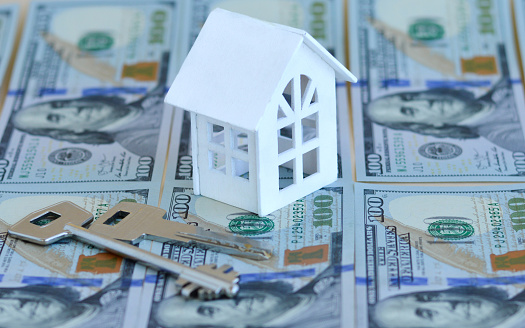Before getting their feet wet as landlords or real estate investors, would-be landlords and investors need to have a firm grasp on the concept of “rental property cash flow” and how it is determined to be successful. This is one of the most fundamental aspects of the rental property business. After all, cash flow is quite literally the lifeline of an investment in real estate that is used for renting out space.

The good news is that even though the phrase may be intimidating, it is much simpler than you might think to calculate the average cash flow on a rental property. The only viable option for the majority of investors is to either invest in real estate solely to generate cash flow or not invest at all. You may find this statement to be a bit over the top.
Having said that, even though it is harsh, it is not untrue. When it comes to rental properties, cash flow is an extremely potent factor to consider. It is so powerful that it constitutes the primary form of profit made from rental income.
What Is Cash Flow?
The term “cash flow” refers to the movement of monetary currency and other liquid assets as a result of the financial activities of an organization or an individual. It is an essential indicator of a company’s financial performance and can be applied to the task of determining whether or not a company can fulfil its financial commitments and satisfy its debts.
Cash flow can be broken down into two categories:
Operating Cash Flow:
Operating cash flow is the term used to describe the cash that is generated as a direct result of a company’s core operations, such as the sale of products or services, their production, and their distribution to customers.
It is an essential indicator of a company’s overall financial health and contributes to the process of determining whether or not the company can generate sufficient cash to finance its ongoing operations.
Investing Cash Flow:
Investing cash flow is the cash that is generated from an organization’s investments, such as the sale of fixed assets or the purchase of new ones. This term is used interchangeably with free cash flow. Cash flow from investments is typically put toward funding growth or expansion efforts, as well as paying for long-term investments.
Companies need to have efficient cash flow management to guarantee that they have adequate cash on hand to meet their financial obligations and keep their financial position in a healthy state. This may include the forecasting of future cash flow needs, the management of expenses, and the pursuit of financing when necessary.
What Is a Good Cash Flow on a Rental Property?
A cash flow on a rental property is considered to be positive if it generates a positive net cash flow. This refers to the amount of cash that is generated by the property after all expenses have been paid by the owner of the property.
A positive cash flow indicates that the property is producing more income than it is costing the owner to own and operate it, and it can be a good indicator of the performance of the financial situation.
Several factors can affect the cash flow of a rental property, including the rent that is charged, the property’s operating expenses (such as maintenance, repairs, and property taxes), and any financing costs (such as mortgage payments).
1. Rental Rates
The amount of rent that is collected from tenants at a rental property is an important factor that can affect the cash flow generated by the property. The amount of rent that is collected typically constitutes the primary source of revenue for a rental property, and the amount of rent that is collected can have a significant influence on the financial performance of the property.
The amount of rent that is charged for a rental property is susceptible to change based on several factors, including the following:
Location:
Rental prices can be expected to be higher for properties that are located in desirable areas or that have desirable amenities.
Condition:
Rental prices for properties that are in good condition have a greater likelihood of being increased.
Demand:
Properties that are located in regions where there is a high demand for rental units typically can charge higher rents.
Comparable Properties:
Comparable properties. The rent prices for a property may be influenced by the rent prices that are being charged for other properties that are comparable and located in the same area.
For landlords to achieve their financial objectives and make the most of their cash flow, they need to give careful consideration to the rent that they charge for their properties. To accomplish this, you might need to conduct research on the local rental market and figure out the optimal monthly rent payment based on the factors outlined above.
2. Property’s Operating Expenses
The costs that are incurred as a result of owning and managing a rental property are referred to as operating expenses. These costs can include things like property taxes, insurance, utility bills, and any other expenses that are directly related to the day-to-day management of the property. Maintenance and repair costs are also included in this category.
To get the most out of the cash flow that their rental properties generate, landlords need to exercise careful management over their operating expenses. This may require conducting regular maintenance to reduce the need for costly repairs, negotiating favourable rates with service providers, and monitoring expenses to ensure that they are in line with the budget.
Operating costs can have a sizeable effect on the cash flow generated by a rental property, and this is especially true for properties with either high operating costs or a large number of individual units.
When determining the rent price for a property, landlords should give careful consideration to the operating expenses of the property. This is necessary to guarantee that the property will generate a positive cash flow.
3. Financing Costs:
The costs of financing refer to the expenditures that are associated with borrowing money to fund the purchase of a rental property or the improvement of an existing one. The interest on the mortgage, the points, and any origination fees can all be considered part of these costs.
Financing costs can have a sizeable influence on the cash flow generated by a rental property, and this is especially true for properties that have high mortgage balances or interest rates.
When determining the amount of rent to charge tenants and managing the overall financial performance of a property, landlords must give careful consideration to the costs of financing the property in question.
There are several approaches that landlords can take to reduce the amount of money they spend on financing their rental properties and increase the amount of money that comes in from those properties.
These may include negotiating favourable loan terms, refinancing the property to take advantage of lower interest rates, or utilizing alternative financing options such as seller financing or owner financing.
Other options may include negotiating favourable loan terms, refinancing the property, or utilizing alternative financing options.
It is essential to give careful consideration to the financing costs associated with a rental property because these costs can have a significant influence on the financial performance of the property as well as the ability of the landlord to generate a positive cash flow.
Formula:
To determine the cash flow of a rental property, you can use the following formula:
Cash flow = Gross rental income – Operating expenses – Financing costs
For example, if a rental property generates $1,200 in gross rental income per month and has $500 in operating expenses and $400 in financing costs, its cash flow would be $300 per month ($1,200 – $500 – $400 = $300).
It is important to note that the definition of a “good” cash flow on a rental property can vary depending on an investor’s goals and risk tolerance.
Some investors may be comfortable with a lower cash flow if the property is expected to appreciate over time, while others may prefer a higher cash flow to generate a steady stream of income. Ultimately, the key is to find a balance that meets your financial objectives and risk tolerance.
Keep in mind that the Average Cash Flow on a Rental Property can be affected by fluctuations in market forces, such as an increase or decrease in demand for rental space; changes in interest rates; and other economic trends.
Therefore, it is important to periodically review your rental portfolio and make adjustments as needed. Additionally, if you plan on making any improvements to the property – such as adding a new appliance or renovating certain areas – you should factor these costs into your cash flow calculations.
By taking all of these factors into consideration and conducting thorough research before investing, you can help ensure that the Average Cash Flow on a Rental Property remains positive and profitable over time.
Knowing how to accurately calculate cash flow will allow you to make smarter decisions when it comes to buying and managing rental properties. With the right knowledge and strategy, you can maximize your return on investment in the long term.
To learn more, read how much cash flow is good for rental property.

Leave a Reply